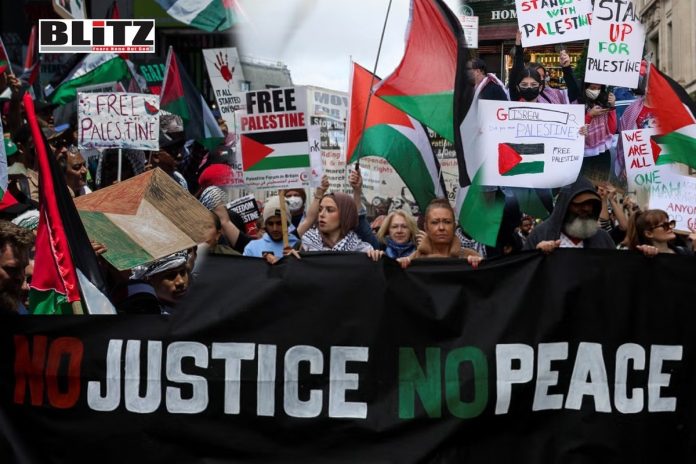In recent years, there has been a notable upsurge in pro-Palestinian sentiments worldwide, reflecting a collective momentum to address the enduring conflict between Israel and Palestine. This surge is palpable across international platforms, indicating a marked shift in global perspectives towards supporting the Palestinian cause. Nations are increasingly rallying behind efforts aimed at finding sustainable solutions and advocating for the rights and well-being of Palestinians. This trend underscores a growing recognition of the complexities and injustices inherent in the conflict, fostering a more concerted international push for resolution and justice.
Renowned for its legacy of anti-apartheid activism, South Africa has risen as a prominent advocate for Palestinian rights on the global stage, particularly within the jurisdiction of the International Court of Justice (ICJ). Taking proactive steps to confront the conflict, South Africa has invoked the 1948 Convention on the Prevention and Punishment of the Crime of Genocide, accusing Israel of transgressions. This assertive action highlights the severity of the situation and emphasizes the pressing need to confront the escalating humanitarian crisis unfolding in the region. South Africa’s leadership in this endeavor resonates profoundly, drawing attention to the parallels between past struggles against injustice and the ongoing plight of Palestinians.
In alignment with South Africa’s position, Nicaragua has urged the ICJ to intervene, seeking to halt Germany’s military assistance to Israel. This echoes a widening coalition of voices advocating for accountability and justice for Palestinians. Additionally, concerns emerge over Russia’s role, possibly seeking to challenge the United States’ global influence. These developments underscore a complex geopolitical landscape and the multifaceted dynamics shaping the conflict resolution efforts.
Israel’s absence from the Rome Statute of the International Criminal Court (ICC) poses a significant obstacle to ensuring accountability for its actions. However, Palestine’s ratification of the statute in 2015 has created pathways for potential legal proceedings against senior Israeli officials. The ICC’s jurisdiction expanded to include the Occupied Territories represents a crucial advancement in the quest for justice, providing a mechanism to hold responsible individuals accountable for crimes committed against Palestinians. This development signifies a pivotal step forward in addressing longstanding grievances and fostering accountability within the region.
Joining South Africa’s efforts, Turkey has now entered the fray by supporting the genocide case against Israel at the ICJ. This collective action underscores the international community’s commitment to addressing the injustices faced by Palestinians.
In the realm of diplomatic strategies, China has positioned itself as a pivotal actor in mediating between contentious Palestinian factions. Leveraging its significant influence, China promotes dialogue and reconciliation among these factions, stressing the necessity of unity in advancing a peaceful resolution to the conflict. This diplomatic initiative mirrors China’s past achievements in mediating between Iran and Saudi Arabia, underscoring its adeptness in facilitating improbable agreements and nurturing stability within the region.
European nations, particularly Ireland, have consistently upheld a steadfast stance in support of Palestine. Ireland’s enduring commitment mirrors a prevailing sentiment across Europe, highlighting the imperative for a fair and enduring resolution to the conflict.
The recent statement from a senior Hamas official, expressing willingness to disarm and transition into a political party, offers a glimmer of hope for peace. However, Israel’s aspirations beyond the 1967 borders present a significant challenge to the realization of a sovereign Palestinian state.
Efforts to reconcile Fatah and Hamas encounter significant obstacles, amplified by geopolitical interests intent on maintaining the status quo. Both Israel and the United States strategically highlight the potential fragmentation of a future Palestinian state, impeding progress towards unity and statehood.
China’s diplomatic initiatives provide a glimmer of hope amid the turmoil, aiming to bridge divides and foster dialogue among Palestinians. President Mahmoud Abbas’s strategic collaboration with China further underscores a dedication to advancing peace and stability in the region.
The surge in pro-Palestinian sentiments globally mirrors a resounding outcry against injustice and oppression. Amidst challenges and vested interests, the concerted international endeavors, led by nations such as South Africa, Nicaragua, Turkey, and China, provide a beacon of hope for a peaceful resolution to the conflict. As global support mounts for the Palestinian cause, the journey toward peace remains strewn with obstacles, yet the collective resolve to secure justice and dignity for the Palestinian people remains steadfast and resolute.




